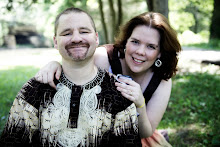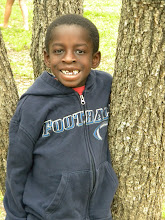HIV/AIDS in Ghana
Ghana is a country where the HIV/AIDS pandemic has not taken hold like it has in many other countries in Africa. The national HIV/AIDS rate is estimated to be somewhere around 2%. The HIV/AIDS rate among women of child-bearing age is higher, at around 4%. There are estimated to be around 25,000 children ages 0-14 who are HIV positive, while maybe 170,000 of Ghana's 1 million orphans were orphaned by AIDS.
Those numbers are good to know and consider. But I wanted to share what HIV/AIDS might look like in Ghana, beyond the numbers.
I know of a child who has HIV. This child's biological family relinquished her because she was malnourished and they couldn't care for her. When she came into care it became known that she was HIV+.
In America the first thing we think to do is go back to the biological family and share the child's status with the bio family, so that the family can take action to treat themselves. But not in Ghana.
Imagine a family living in a very poor rural village, in a family compound of 30 huts (and all of the people who would fit in those huts). They know about HIV/AIDS, but only in the simplest way. It is death, they think. And it probably is, for them. Having HIV/AIDS means persecution. It means being kicked out of your village, and your family compound. It would mean the end of life as they know it, even before the effect of AIDS takes hold.
I have learned this week that sometimes Social Welfare does NOT want to tell the families of HIV+ children that their child is HIV+. If the families know the child is positive, then they will need to be tested. If they are tested and are positive, someone is likely to find out. People TALK in Ghana. If someone finds out, they will most likely be ex-communicated from their village/family.
Maybe this wouldn't be the case in fairly-developed Accra. I'm talking about rural Ghana here.
So the bio family isn't always told that HIV is running somewhere in their family's veins. Maybe the dad takes on more wives, and has more children. The virus spreads from there. People die. But they die of "respiratory issues", with their family and friends at their side. They don't die alone.
What a difficult issue. I can see both sides of it. What do you think?
Anita










6 comments:
Wow...just wow. I can most certainly see both points. Thank you for sharing something that is so much on my heart lately.
This is so very complicated an issue, isn't it. The more I traverse the earth, the more gray areas I see in difficult situations. This one is incredibly gray because both sides have very valid, very human points. I ache for those that have been outcast. I ache for the other children, wives and husbands that will be infected.
Today you did us all a service of exposing the reality of both sides of this issue. It dare say it is an issue many of us have not confronted much, as our lives here are so far removed from the lives in those remote Ghanaian villages.
But we should know about it. We should know about the stigma, the lack of resources to get medication that can make HIV a chronic condition rather than a death sentence. Not to judge, but to understand and reflect on what could be done to help...
Thanks for this eye-opening post Anita.
Perhaps I am cruel, but in the absence of educating people about HIV (which I think should be step 1) I feel it is preferable for one person to die alone then for countless others to be infected. This child you spoke of is one of thousands of innocent victims in this situation. While it is tragic for someone to be sent away from their home and family, in the big picture it is better for them to die alone then to cause the deaths of others.
Like I said, the best option here would be to educate and pray that you can change the stigma so these people won't die alone. It's a tough issue.
I think ... tough issue ... I'm glad that I'm not the one having to make the decision about "to tell, or not to tell".
I have visited one of those villages. I have seen the lives lived there. I know that my children's parents died in such a village. I do not know how they died. I am thankful that my children are not HIV+.
Thank you, Anita, for sharing this with us. Thank you for always finding ways to educate us about issues in Ghana.
I pray that this little child will be able to find a forever family.
Laurel :)
Anita,
I saw a documentary about what you are describing exactly. I wish I could remember the name.
It left me with the same questions you ask.
I know I don't have the answer, but pray for these villages and somehow they can find the resources to get treatment.
heart wrenching =(
Post a Comment